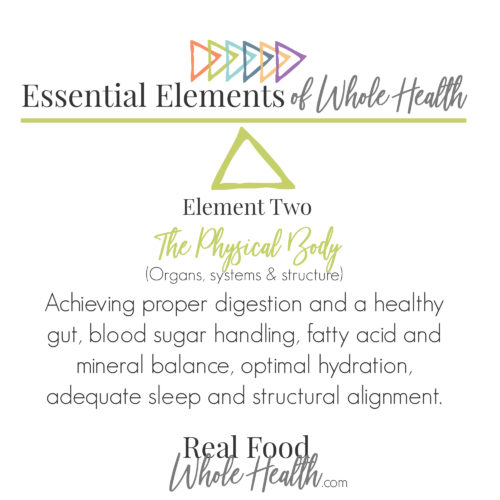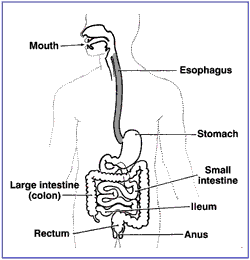
This article is the third in a series of posts exploring the Essential Six Elements of Whole Health, the core of our health philosophy and the foundation for our work with our nutritional therapy clients. This article will be divided into three parts, this is part one. Learn more about the Essential Elements and find the rest of the series here.
Part One
Previously we talked about Essential Element One- A Real Food Diet.
While it is absolutely “essential” that your daily diet consist of properly prepared, nutrient-dense, real, traditional foods that are appropriate for your body & current health status, even the most perfect diet can’t positively influence whole health if the physical body remains in a state of chaos.
The PHYSICAL BODY Essential Element concerns the organs, systems & structure of the body.
This includes achieving proper digestion, sufficient blood sugar handling, appropriate fatty acid and mineral balance, optimal hydration, adequate sleep and maintaining structural alignment.
The various systems of the body, like the circulatory, lymphatic, nervous and endocrine systems, function properly only when these foundations are addressed and balanced.
We often say, “You are not really what you eat, but rather what you digest.”
Now, good food is important because a poor diet won’t nourish you no matter how well you digest it, but even healthful, nutrient-dense foods can become toxic to the body if digestion is not functioning properly.
So how does digestion actually work?
Here’s a quick overview:

Digestion begins in the brain when we think about or smell food.
Chemical changes begin happening at that point. When we actually eat the food, we must chew well to break down the food and ensure it is mixed well with the saliva in the mouth.
Saliva contains salivary amylase, an enzyme that begins breaking down carbohydrates even before the food is swallowed.
From the mouth, the food moves into the stomach where it is supposed to trigger the production of hydrochloric acid (stomach acid). Enzymatic activity continues here as well, with enzymes (and the stomach acid) to break down different components of the food.
The valve that allows the food to move out of the stomach operates on an acid trigger, so it’s important that your stomach have the right amount of stomach acid at the right pH.
Hydrochloric acid also helps protect us from undesirables in our food, killing many pathogens and parasites.
Once the food moves out of the stomach, it goes into the duodenum, or the first part of the small intestine, where hormones signal the pancreas to release enzymes and the gallbladder to release bile, which digests fats.
As the food moves through the rest of the small intestine, the bulk of nutrient absorption happens, and bacteria in our gut plays a large role in healthy assimilation of nutrients.
Food then moves into the large intestine (or colon) where recycling of water and various other substances occurs before the waste products are formed into solid waste to be moved out of the body.
So, as you can see, digestion is a lot more than just food moving from mouth to tail; it is a process that involves complex relationships between multiple organs, systems and the trillions of beneficial bacteria in our gut.
There are a myriad of things that can go wrong with the major players in digestion, like hypochlorhydria (not enough stomach acid- this is VERY common in today’s world of stress, processed food, blood sugar dysregulation and antacid medication), leaky gut syndrome (where the lining of the intestines is damaged and nutrient absorption can not occur), dysbiosis (an imbalance of beneficial and pathogenic bacteria and yeasts in the gut) and gallbladder dysfunction (from having the organ removed, eating a low-fat or bad-fat diet or lacking proper nutrients to build healthy bile).
It’s vital that imbalances be corrected in digestion, or the food we eat can not nourish us properly, vitamins and minerals become deficient and widespread bodily disease follows.
Good digestion is absolutely fundamental to nutritional therapy and whole health. Remember that Hippocrates stated (around 300 BC) that “ALL DISEASES BEGIN IN THE GUT”.
When the gut is damaged, all sorts of problems begin to occur- everything from depression to autoimmune disease, ADD/ADHD to food allergies, seasonal allergies (and weakened immune system) to mental disorders have their roots in the health of the gut.
Keep reading for Part Two here.


I like this series – well done. So was the Kombucha video. Question, if you don’t take the SCOBY out of the Kombucha after ten days, its it still good as long as there is no mold? Thanks, Susan
Thanks Susan! 🙂 Yes, the scoby is still fine. I keep my extra scobys in a scoby hotel- a large glass container with kombucha in it and all the scobys submerged. Each time I add a scoby (the baby from my latest batch) I add a little more kombucha. They last a really long time 🙂
I like this series – well done. So was the Kombucha video. Question, if you don’t take the SCOBY out of the Kombucha after ten days, its it still good as long as there is no mold? Thanks, Susan
Thanks Susan! 🙂 Yes, the scoby is still fine. I keep my extra scobys in a scoby hotel- a large glass container with kombucha in it and all the scobys submerged. Each time I add a scoby (the baby from my latest batch) I add a little more kombucha. They last a really long time 🙂
Interesting and inspiring. I need to start improving my diet- my gut can’t be happy after all the junk I ate over Thanksgiving.
Interesting and inspiring. I need to start improving my diet- my gut can’t be happy after all the junk I ate over Thanksgiving.
So basically, pizza is ok as long I make sure to chew really well?!?! lol just kidding, love you Amy!
LOL!
So basically, pizza is ok as long I make sure to chew really well?!?! lol just kidding, love you Amy!
LOL!
I appreciate the emphasis on digestion as this is such an important aspect to health. This is something I am working on diligently for myself. No more tummy troubles for me please 🙂
Thanks for your comment, Marissa! Absolutely- digestion is fundamental to our overall health. If we couldn’t digest the nutrients in our food, we would cease to be. That’s powerful stuff!
I appreciate the emphasis on digestion as this is such an important aspect to health. This is something I am working on diligently for myself. No more tummy troubles for me please 🙂
Thanks for your comment, Marissa! Absolutely- digestion is fundamental to our overall health. If we couldn’t digest the nutrients in our food, we would cease to be. That’s powerful stuff!